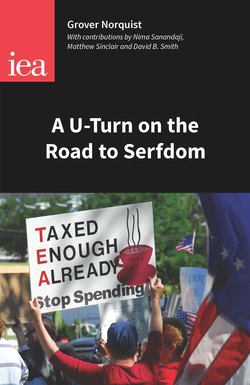Читать книгу A U-Turn on the Road to Serfdom - Grover Norquist Glenn - Страница 12
На сайте Литреса книга снята с продажи.
The Ryan budget
ОглавлениеJust as the Tea Party demonstrations in 2009 and the Republican capture of the House of Representatives in November 2010 demonstrated real political muscle in the anti-spending movement, Congressman Paul Ryan of Wisconsin introduced his Path to Prosperity budget for the United States. Potentially, this is the U-turn on the road to serfdom. The Ryan plan combines tax reform and spending reform. Ryan’s tax reform lowers corporate and individual marginal tax rates down to 25 per cent and moves the United States to a territorial tax system so that we don’t double tax expatriates who live overseas and businesses that are doing business overseas. It also moves towards full expensing for business investment. The plan would be very pro-growth and it greatly simplifies the tax code and makes it more transparent.
On the spending side, Ryan takes many of the 185 means-tested welfare programmes and would provide block grants to the 50 states. States would, over time, receive less in federal aid in return for more freedom to run their programmes. When this was done with AFDC – the aid to families with dependent children programme – in 1996, the states dramatically reduced welfare spending and many poor Americans were freed from welfare dependency. We reformed welfare and saved money by giving states more autonomy. The Ryan plan proposes this for the other major welfare programmes. Ryan also proposes reforms to underfunded entitlement programmes, such as Medicare, to eliminate unfunded liabilities.
Without such reforms, government spending on entitlements will drive total federal spending from 20 per cent of GDP to as high as 40 per cent of GDP. The Ryan plan reforms government to cost less and lowers federal government spending down to somewhere below 20 per cent of GDP.
So the Ryan plan would take government to about half of what it would otherwise be. But turning a ship round takes a long time. The reforms in this plan would be phased in slowly, minimising opposition. The Republican Party is united in support of the Ryan plan. One or two people voted no because they thought it wasn’t tough enough. But almost every Republican Congressman and Senator supported the budget, voted for it, and they got re-elected in 2012.
They have now voted for it three times. There is a depth of understanding within the modern Republican Party of what this plan does. When I was first speaking with Congressman Ryan about his plan, I asked, ‘Do you want me to help to get co-sponsors?’ Normally, a congressman wishes to have many co-sponsors to show support and strength. Instead Ryan said, and I paraphrase, ‘No, I’m not going to let anyone co-sponsor the Ryan budget plan until I am convinced they understand it, so that when they talk to the press, they articulate it correctly; they don’t misstate what’s in it or say things that might come back to hurt the plan. I want them to be serious advocates and apostles for the plan.’ And he did that.
Again, early in 2013, I called Congressman Ryan and said: ‘You know, Hernando De Soto would like to come by and visit you to talk about some of the work he’s doing on property rights in Tunisia and some other countries.’ Ryan said: ‘Oh, that would be great. I’m a big fan of his work. Let’s get together in two and a half months.’ I said, ‘That long? He just needs half an hour.’ Congressman Ryan said: ‘At the moment, I am meeting with every member of the Republican caucus to work through this budget; the update of the last one, so that they have a full understanding of what is in the budget.’ He is talking in detail about the changes from last year to this year. That is the depth of knowledge about the plan. So, when we talk about Republicans taking the Senate and the presidency we know what they will do.
This is not wishful thinking. The Republican vision for saving the economy and American liberty is the Ryan plan. It is written down. Every member of Congress gets yelled at about it by folks from the left; they get asked about it by the press. They can competently defend it and articulate it, which I think is extremely important.
